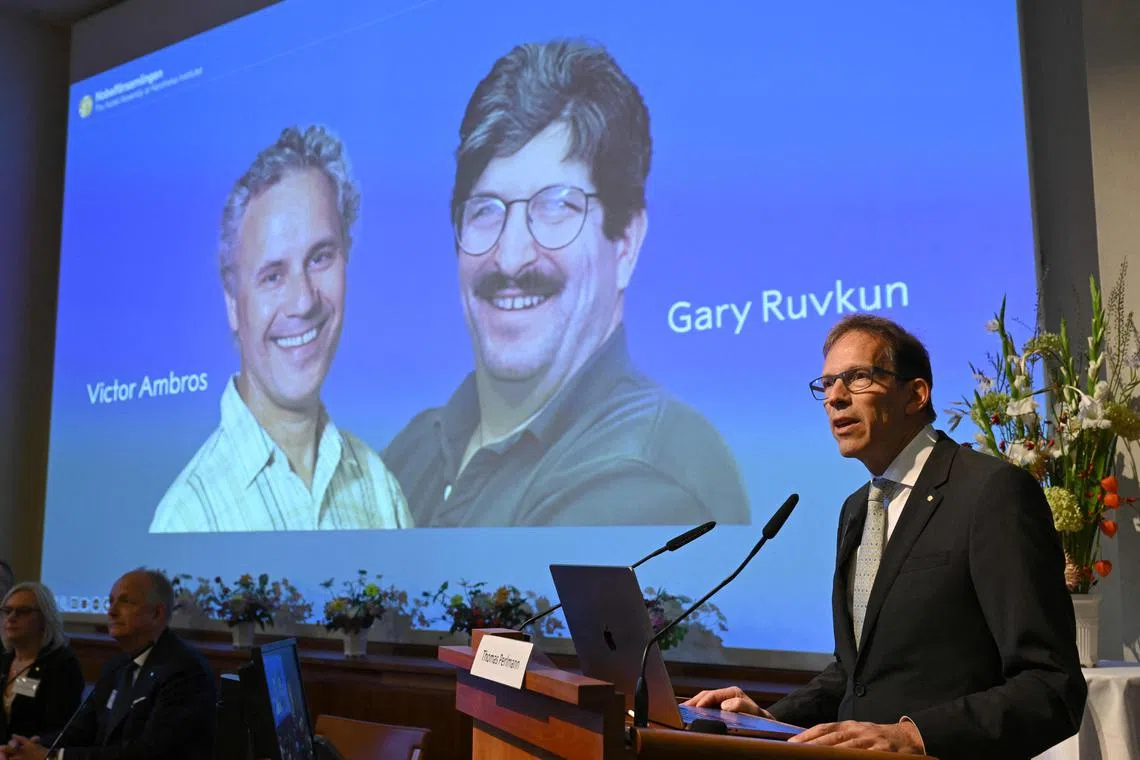Nobel Prize in medicine awarded to US scientists for work on microRNA
Sign up now: Get ST's newsletters delivered to your inbox

Nobel medicine prize winners Victor Ambros and Gary Ruvkun had discovered a new class of tiny RNA molecules, which play a role in gene regulation.
PHOTO: AFP
STOCKHOLM – US scientists Victor Ambros and Gary Ruvkun won the 2024 Nobel Prize in Physiology or Medicine on Oct 7 for the discovery of microRNA and its crucial role in how multicellular organisms grow and live.
Their work helped explain how cells specialise and develop into different types, such as muscle and nerve cells, even though all the cells in an individual contain the same set of genes and instructions for growing and staying alive.
“The Nobel’s, you know, there’s a word we use for Major League Baseball, it’s called ‘The Show’. Which means it’s not any show, it’s the show,” Dr Ruvkun told Reuters by phone, describing what it was like being thrust into the global spotlight.
He joked that collaborating with Dr Ambros and receiving previous awards meant they had been “joined at the hip for quite a while”.
“That’s been great. He’s a wonderful guy,” Dr Ruvkun added. Dr Ambros said he was happy to share the award with “a great friend”.
The Nobel Assembly, the award-giving body, said in a statement that the laureates discovered a new class of tiny RNA molecules, which play a crucial role in gene regulation.
“Their ground-breaking discovery revealed a completely new principle of gene regulation that turned out to be essential for multicellular organisms, including humans,” the assembly said.
Dr Ambros, 70, described microRNA as a “communication network amongst genes that enables the cells in our bodies to generate all kinds of different complex structures and functions”.
He is a professor at the University of Massachusetts Medical School, while Dr Ruvkun, 72, is a professor at Harvard Medical School and also affiliated with Massachusetts General Hospital in Boston.
In the late 1980s, Dr Ambros and Dr Ruvkun undertook postdoctoral studies in the laboratory of scientist Robert Horvitz – himself a Nobel Prize winner in 2002 – studying a 1mm-long roundworm.
Their discoveries on how certain microRNAs in the roundworm govern growth of organs and tissue were initially dismissed as specific to the species.
More work published by Dr Ruvkun’s research group in 2000, however, showed that all animal life had relied on the mechanism for more than 500 million years.
Building blocks for life
MicroRNA comes into play when single-strand messenger RNA – the subject of 2023’s Nobel Prize in medicine – is decoded and translated into making proteins, the building blocks of all human and animal life.
Messenger RNA, or mRNA, in turn, emerges from the universal blueprint in every cell nucleus, the double-helix DNA.
Professor Gunilla Karlsson Hedestam of Sweden’s Karolinska Institutet medical university said that while the 2023 prize was linked to the specific use in Covid-19 vaccines, the 2024 award was for a leap in basic understanding with many potential future applications.
Dr Janosch Heller, an assistant professor of biomedical sciences at Dublin City University who was not involved in selecting the winners, said that the findings had boosted the understanding of diseases such as epilepsy.
The winners of the prize for physiology or medicine are selected by the Nobel Assembly at Karolinska Institutet, and receive a sum of 11 million Swedish krona (S$1.4 million).
Every year, the medicine prize is the first to be unveiled in the crop of Nobels, arguably the most prestigious prizes to be awarded for science, literature and humanitarian endeavours. The remaining five are set to be unveiled over the coming days. Created via the will of Swedish dynamite inventor and businessman Alfred Nobel, the prizes have been awarded for breakthroughs in science, literature and peace since 1901, while economics was a later addition.
Past winners of the Nobel medicine prize include many famous researchers such as Russian physiologist Ivan Pavlov in 1904, most known for his experiments on behaviour using dogs, and Scottish bacteriologist Alexander Fleming, who shared the 1945 prize for the discovery of penicillin.
In 2023, the medicine prize was awarded to the runaway favourites Katalin Kariko, a Hungarian scientist, and US colleague Drew Weissman, for discoveries that paved the way for Covid-19 vaccines that helped curb the pandemic.
Steeped in tradition, the science, literature and economics prizes are presented to the laureates in a ceremony on Dec 10, the anniversary of Alfred Nobel’s death, followed by a lavish banquet at Stockholm City Hall.
Separate festivities are held for the winner of the peace prize in Oslo on the same day. REUTERS


